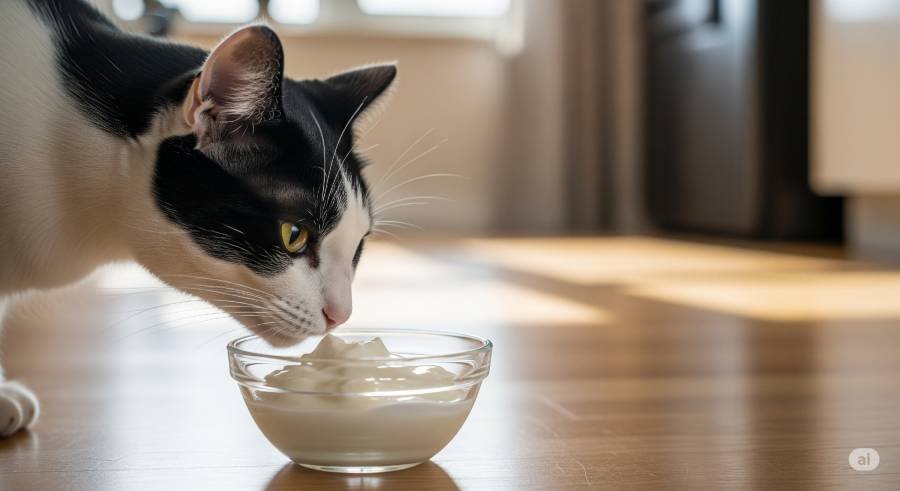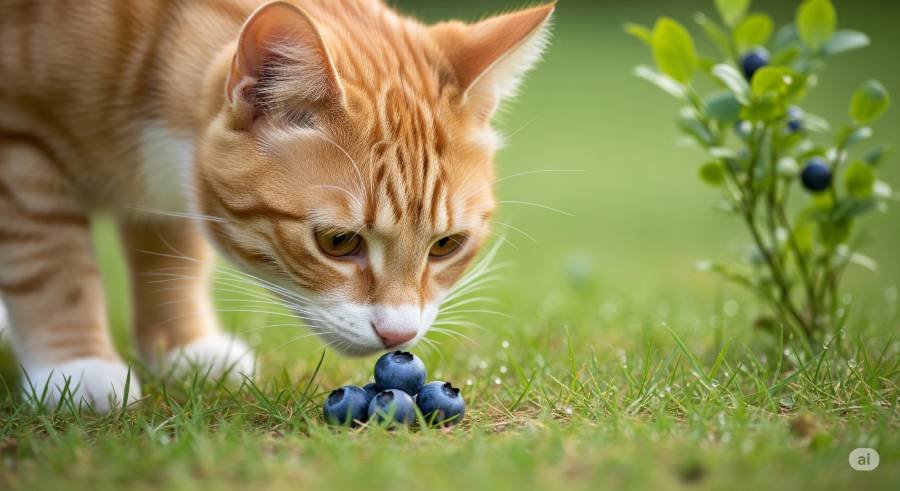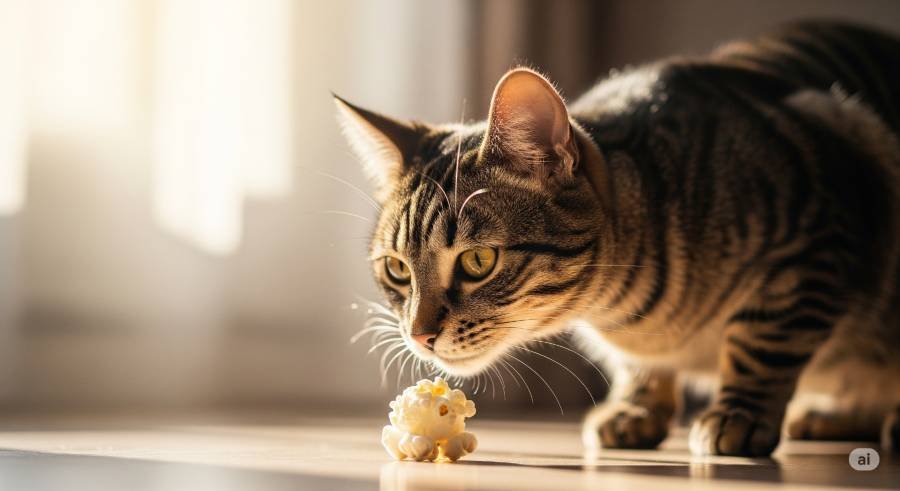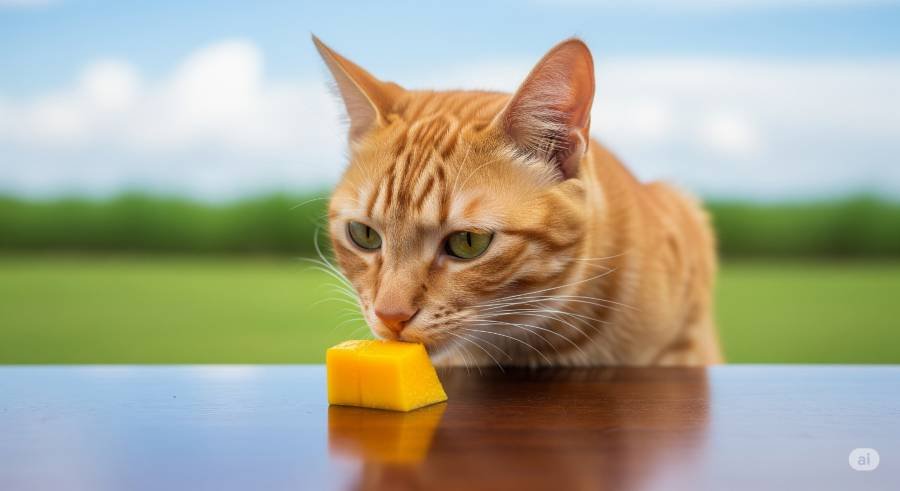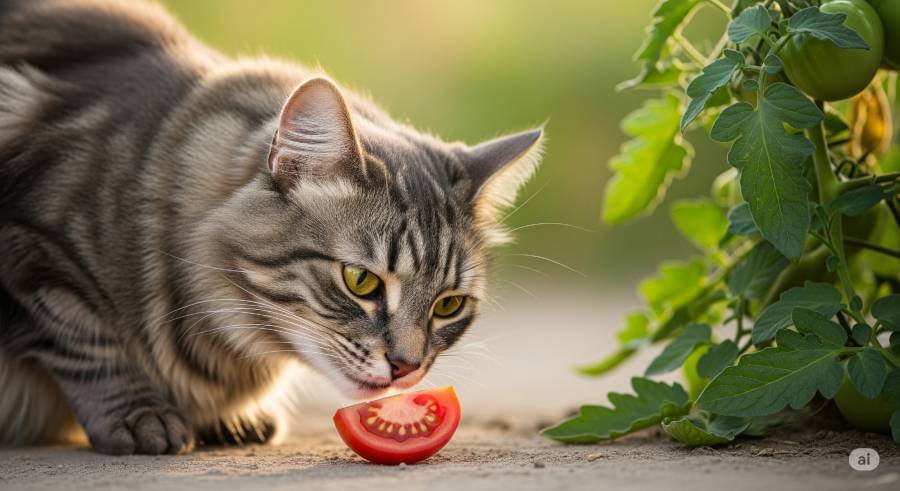Cats can safely enjoy small amounts of fully cooked, plain, boneless salmon as an occasional treat, provided it’s free of seasonings and properly prepared.
As obligate carnivores, felines benefit from meat-based diets, and salmon can be a nutritious addition, but careful preparation is essential to avoid risks.
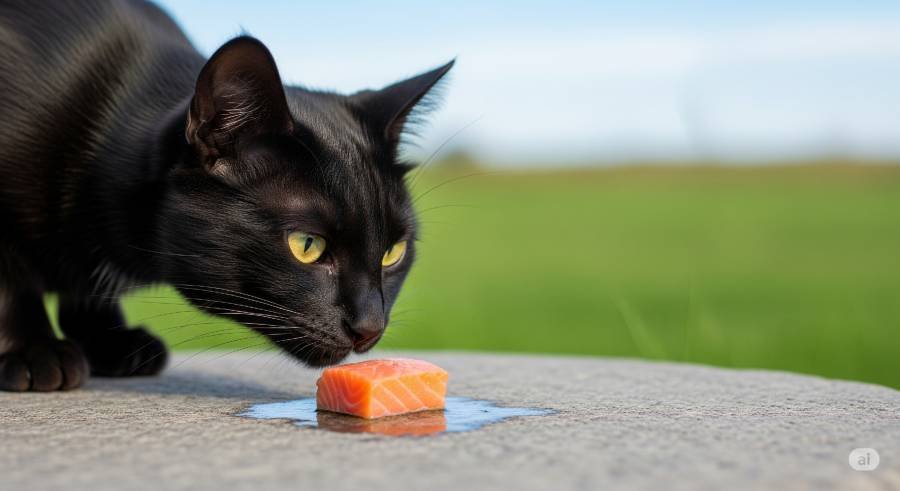
Potential Benefits of Salmon for Cats
When prepared correctly, salmon provides several benefits for felines:
- High-Quality Protein: Salmon is packed with protein, crucial for feline muscle maintenance, energy, and overall vitality.
- Omega-3 Fatty Acids: Rich in omega-3s, salmon supports healthy skin, a shiny coat, and may reduce inflammation, benefiting joint and heart health.
- Vitamins and Minerals: Salmon offers vitamins B12 and D, along with selenium, which bolster immune function and metabolic health.
- Taste Appeal: The strong aroma and flavor of salmon make it highly palatable, ideal for enticing fussy eaters.
- Moisture Content: Cooked salmon’s high water content aids hydration, particularly for felines that don’t drink enough water.
These benefits make salmon a valuable treat, but moderation is key to prevent dietary imbalances. For more on protein-rich foods, see our guide on what human food can cats eat.
Risks and Dangers of Salmon for Cats
While cooked salmon is generally safe, several risks must be addressed:
- Raw Salmon: Raw or undercooked salmon may harbor bacteria like Salmonella or parasites such as Neorickettsia helminthoeca, which can cause salmon poisoning disease, a potentially fatal condition with symptoms like vomiting, diarrhea, fever, or lethargy.
- Bones: Salmon bones are a choking hazard and can cause intestinal blockages or perforations if ingested.
- Seasonings and Additives: Salmon prepared with salt, garlic, onions, or oils is unsafe. High salt levels can lead to sodium poisoning, while garlic and onions are toxic, causing anemia. For more on toxic ingredients, check our articles on can cats eat garlic and can cats eat onions.
- High Fat Content: Salmon’s natural fat content can cause digestive upset, obesity, or pancreatitis if overfed, especially in sensitive felines.
- Mercury Exposure: Salmon, particularly wild-caught, may contain low levels of mercury. Small, occasional portions are unlikely to harm, but frequent feeding should be avoided.
- Allergies: Some felines may have fish allergies, leading to itching, swelling, or gastrointestinal issues.
- Nutritional Imbalance: Over-reliance on salmon can lead to deficiencies in essential nutrients like taurine, critical for feline health.
How to Safely Feed Salmon to Cats
To ensure salmon is safe, follow these precautions:
- Cook Thoroughly: Use fully cooked salmon (baked, boiled, or steamed) to eliminate bacteria and parasites. Avoid raw or undercooked salmon. For more on raw foods, see can cats eat raw meat.
- Remove Bones and Skin: Completely debone salmon and remove the skin, which is high in fat and harder to digest.
- Keep It Plain: Ensure salmon is free of salt, garlic, onions, spices, or oils.
- Feed Sparingly: Offer a small piece (e.g., a teaspoon-sized portion) once or twice a month. Treats should not exceed 10% of a feline’s daily caloric intake.
- Chop Finely: Dice salmon into small, bite-sized pieces to prevent choking and aid digestion.
- Monitor Reactions: Introduce salmon gradually and observe for digestive upset (e.g., vomiting, diarrhea) or allergic reactions (e.g., itching, swelling) over 24–48 hours. Stop feeding salmon and consult a veterinarian if issues arise.
- Consult a Vet: Seek veterinary advice before offering salmon, especially for felines with conditions like allergies, obesity, or pancreatitis.
Signs of Salmon-Related Issues
If a feline consumes unsafe salmon or reacts adversely, watch for:
- Vomiting or diarrhea
- Fever, lethargy, or weakness (possible signs of salmon poisoning from raw fish)
- Choking or difficulty swallowing (from bones)
- Excessive thirst or urination (indicating salt poisoning from seasoned salmon)
- Pale gums or rapid breathing (possible signs of garlic or onion toxicity)
- Itching or swelling (suggesting an allergic reaction)
If these signs appear, discontinue salmon and contact a veterinarian immediately. Salmon poisoning or toxicity requires urgent care.
Expert Opinions
Veterinary sources, such as the ASPCA and VCA Hospitals, confirm that fully cooked, plain salmon is non-toxic to felines but warn against raw salmon due to risks of bacterial or parasitic infections. The ASPCA advises removing bones and avoiding seasonings like garlic or onions. Veterinarians recommend limiting salmon to occasional treats and prioritizing balanced feline diets. For more on safe seafood, explore our articles on can cats eat tuna and can cats eat sardines.
Additional Considerations
- Health Conditions: Felines with fish allergies, pancreatitis, obesity, or kidney issues should avoid salmon due to its fat content or potential allergens. Consult a vet before offering it.
- Kittens: Kittens have sensitive digestive systems and are more susceptible to parasitic infections, so salmon should be avoided.
- Feline Preferences: While many felines love salmon, some may not enjoy its taste. If uninterested, try alternatives like those in can cats eat chicken.
- Wild-Caught vs. Farmed: Farmed salmon may have lower mercury but could contain antibiotics or dyes. Choose high-quality, plain salmon and cook it thoroughly.
- Commercial Cat Foods: Salmon is a common ingredient in cat foods, formulated to be safe and balanced. Verify with a vet if unsure about a product.
Safe Treat Alternatives
Instead of salmon, consider these feline-safe treats, tailored to complement a protein-rich diet:
- Cooked Turkey or Chicken: Plain, unseasoned poultry offers high-quality protein without the risks of fish.
- Sardines: Small amounts of plain, cooked sardines provide similar omega-3 benefits.
- Peas: A few cooked peas offer fiber and are low in calories.
- Pumpkin Puree: A teaspoon of plain, canned pumpkin aids digestion.
Introduce new treats gradually, monitor for reactions, and consult a vet if unsure about safety.
Felines can enjoy small amounts of fully cooked, plain, boneless salmon as a rare treat, offering protein and omega-3s when prepared correctly.
However, risks like raw salmon’s bacterial dangers, bones, or seasonings require careful handling. Felines with health issues or kittens should avoid salmon, and a balanced, meat-based diet with feline-specific treats is optimal.
Always consult a veterinarian before introducing salmon or other human foods. For more on feline nutrition, check our guides on can cats eat tuna, can cats eat sardines, or what human food can cats eat.
For additional questions about feline-safe foods or nutrition, feel free to ask!
